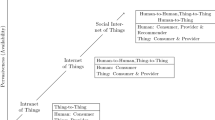Abstract
Integrating social networking features into the Internet of Things (IoT) has evolved to a new era of Social Internet of Things (SIoT). SIoT enables the social interaction among various devices, facilitating the data sharing for achieving similar applications. SIoT devices are capable of making any number of friends. But this friendliness property thrusts for providing reliable and secured services. Therefore, the prime necessity of a trust management scheme in SIoT paradigm is to ensure safer communication among the social devices. In this work, an energy efficient and light weight Friendliness based Trustworthy Relationship Management model for providing reliable services in SIoT is proposed. We also present a cryptographic key establishment strategy based on the device friendship directory updation. A Dynamic Friendship Supervision scheme is proposed for managing the device friendliness. Based on the updated friendship directory, a Privacy Protection Paradigm is modelled and implemented using a set of cryptographic techniques. Robustness of the proposed relationship approach which delivers trust, privacy and security is validated using two distinct real-world datasets such as MIT AI and ARAS dataset containing 201 sensors. Experimental outcomes attest that the proposed trust management model beats the state-of-art methods using an extensive set of simulations. The quantitative comparison is made for the metrics such as packet delivery ratio, detection probability, throughput, energy consumption, transaction success rate, resilience, attack frequency which enhances the trust, privacy and security in SIoT network.











Similar content being viewed by others
References
Lin, J., Yu, W., Zhang, N., Yang, X., Zhang, H., & Zhao, W. (2017). A survey on Internet of Things: Architecture, enabling technologies, security and privacy, and applications. IEEE Internet of Things Journal, 4(5), 1125–1142.
Atzori, L., Iera, A., & Morabito, G. (2010). The Internet of Things: A survey. Computer Networks, 54(15), 2787–2805.
Maa, R., Wanga, K., Qiua, T., Sangaiahb, A. K., Lina, D., & Liaqatc, H. B. (2017). Feature-based compositing memory networks for aspect-based sentiment classification in Social Internet of Things. Future Generation Computer Systems. https://doi.org/10.1016/j.future.2017.11.036
Rajendran, S., & Jebakumar, R. (2021). Object Recommendation based Friendship Selection (ORFS) for navigating smarter social objects in SIoT. Microprocessors and Microsystems, 80, 103358. https://doi.org/10.1016/j.micpro.2020.103358
Rajendran, S., & Jebakumar, R. (2020). Cognitive Based Device Recommendation (CDR) model for social internet of things. In 2020 IEEE 4th Conference on Information & Communication Technology (CICT), pp. 1–6. https://doi.org/10.1109/CICT51604.2020.9312094
Nitti, M., Girau, R., Atzori, L., Iera, A., & Morabito, G. (2012) A subjective model for trustworthiness evaluation in the Social Internet of Things. In 23rd international symposium on Personal, Indoor and Mobile Radio Communications-(PIMRC), pp 18–23.
Bao, F., Chen, R., & Guo, J. (2013) Scalable, adaptive and survivable trust management for community of Interest based Internet of Things systems. In Eleventh International Symposium on Autonomous Decentralized Systems (ISADS), pp 1–7.
Panda, M., & Abraham, A. (2014). Development of a reliable trust management model in Social Internet of Things. International Journal of Trust Management in Computing and Communications, 2(3), 229–258.
Chen, R., Guo, J., & Bao, F. (2014) Trust management for service composition in SOA-based IoT systems. In Wireless Communications and Networking Conference (WCNC), pp. 3444–3449.
Xiao, H., Sidhu, N., & Christianson, B. (2015) Guarantor and reputation based trust model for Social Internet of Things. In International Wireless Communications and Mobile Computing Conference (IWCMC), pp. 600–605.
Chen, Z., Ling, R., Huang, C.-M., & Zhu, X. (2015). A scheme of access service recommendation for the Social Internet of Things. International Journal of Communication Systems, 29, 694–706.
Rafey, S. E. A., Abdel-Hamid, A., & El-Nasr, M. A. (2016) CBSTM-IoT: Context-based social trust model for the Internet of Things. In Proceedings of International Conference on Selected Topics in Mobile & Wireless Networking (MoWNeT), pp. 1–8.
Chen, R., Bao, F., & Guo, J. (2016). Trust-based service management for Social Internet of Things systems. IEEE Transactions on Dependable and Secure Computing, 13(6), 684–696.
Truong, N. B., Lee, H., Askwith, B., & Lee, G. M. (2017). Toward a trust evaluation mechanism in the Social Internet of Things. Sensors, 17(6), 1346.
Truong, N. B., Um, T. W., & Lee, G. M. (2016). A reputation and knowledge based trust service platform for trustworthy Social Internet of Things. In Innovations in Clouds, Internet and Networks (ICIN), Paris, France.
Zhang, L., Li, L., Medwedeff, E., Huang, H., Fu, X., & Wang R. (2019). Privacy protection of social networks based on classified attribute encryption, security and communication networks.
Marche, C., & Nitti, M. (2020). Trust-related attacks and their detection: A trust management model for the social IoT. IEEE Transactions on Network and Service Management. https://doi.org/10.1109/TNSM.2020.3046906
Son, J., Choi, W., & Choi, S.-M. (2020). Trust information network in Social Internet of Things using trust-aware recommender systems. International Journal of Distributed Sensor Networks. https://doi.org/10.1177/1550147720908773
Jafarian, B., Yazdani, N., & Haghighi, M. S. (2020). Discrimination-aware trust management for Social Internet of Things. Computer Networks, 178, 107254. https://doi.org/10.1016/j.comnet.2020.107254
Roopa, M. S., Puneetha, Vishwas, RajKumar Buyya, Venugopal, Iyengar, & Patnaik. Trust management for service-oriented SIoT systems. In 2020 The 8th International Conference on Information Technology: IoT and Smart City (ICIT 2020). Association for Computing Machinery (pp. 216–222). https://doi.org/10.1145/3446999.3447635
Ba-hutair, M., Bouguettaya, A., & Ghari-Neiat, A. (2021). Multi-perspective trust management framework for crowdsourced IoT services. IEEE Transactions on Services Computing. https://doi.org/10.1109/TSC.2021.3052219
Dhelim, S., Ning, H., Farha, F., Chen, L., Atzori, L., & Daneshmand, M. (2021). IoT-enabled social relationships meet artificial social intelligence. ArXiv, arXiv:2103.01776
Narang, N., & Kar, S. (2021). A hybrid trust management framework for a multi-service social IoT network. Computer Communications, 171, 61–79.
Babar, S., & Mahalle, P. (2021). Trust management approach for detection of malicious devices in SIoT. Tehnički Glasnik, 15(1), 43–50.
Tapia, E. M., Intille, S. S., & Larson, K. (2004). Activity recognition in the home using simple and ubiquitous sensors. In International conference on pervasive computing, pp. 158–175.
Alemdar, H. O., Ertan, H., Incel, O. D., & Ersoy, C. (2013). ARAS human activity datasets in multiple homes with multiple residents.
Luo, J. H., Liu, X., & Fan, M. Y. (2009). A trust model based on fuzzy recommendation for mobile ad-hoc networks. Computer Networks, 53, 2396–2407.
Acknowledgements
The authors like to acknowledge Massachusetts Institute of Technology (MIT) and Activity Recognition and Ambient Sensing (ARAS) for providing the free publicly available sensor databases from the smart environments which are used in this study. The authors would also like to thank SRM Institute of Science and Technology for providing the necessary infrastructure to carry out this research on SIoT.
Author information
Authors and Affiliations
Corresponding author
Additional information
Publisher's Note
Springer Nature remains neutral with regard to jurisdictional claims in published maps and institutional affiliations.
Rights and permissions
About this article
Cite this article
Rajendran, S., Jebakumar, R. Friendliness Based Trustworthy Relationship Management (F-TRM) in Social Internet of Things. Wireless Pers Commun 123, 2625–2647 (2022). https://doi.org/10.1007/s11277-021-09256-8
Accepted:
Published:
Issue Date:
DOI: https://doi.org/10.1007/s11277-021-09256-8




